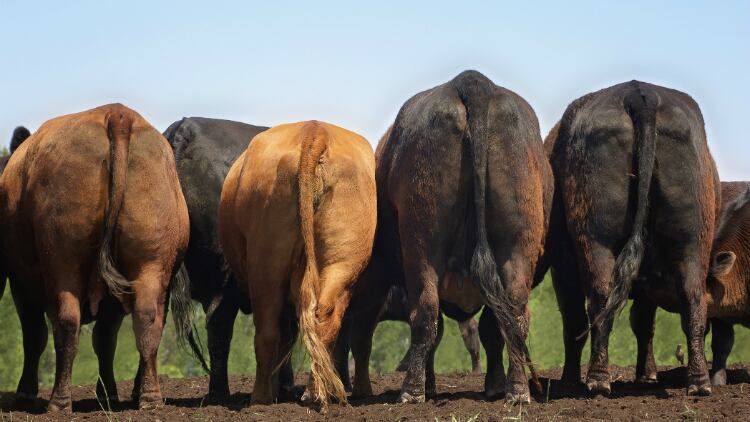Meat farming already gets a pretty bad rap from environmental pressure groups, which claim belching cows damage the environment more than all of the planes, trains and automobiles in the world.
Grass-fed beef producers have looked to challenge this perception, with some arguing that meat from pasture-grazing bovines has higher welfare, nutritional and environmental credentials than factory-farmed meat.
However, researchers from several countries have now taken a fresh look at whether grazing ruminants (mammals that eat grass) contribute to, or combat, climate change.
Carbon captures nullifies around 1% of emissions
In a new report, Grazed and Confused?, the findings are complex, but suggest the idea that grass-fed beef production helps to sequester [capture] carbon is simply wrong.
Produced by the Universities of Oxford, Cambridge and Aberdeen in the UK, the University of Wageningen in the Netherlands, the Centre for Organic Food and Farming at the Swedish University of Agricultural Sciences, the Research Institute of Organic Agriculture in Switzerland and the Commonwealth Scientific and Industrial Research Organisation in Australia, the report analysed the amount of greenhouse gases (GHGs) into and out of pastures.
Researchers found that carbon capture offset only 20%-60% of emissions from cattle, 4%-11% of total livestock emissions and just 0.6%-1.6% of total yearly GHG emissions.

Another problem discovered was that carbon capture stopped after a few decades, when soils reached a “carbon equilibrium”. When this happened, cows on pasture continued to belch and emit methane.
Livestock animals generate about a third of global methane missions, but claims that methane’s environmental impact is temporary – and thus not as bad as, say, the emissions from a car – are incorrect, claimed the researchers.
Catch-22: Livestock benefits and endangers humanity
Methane has a shorter atmospheric life span than carbon dioxide emissions, but it has a stronger, immediate warming effect on the planet, they added.
“Effects, in practice, will be permanent, unless ruminant production is halted,” the report said.
“Methane emissions also increase the risk of us ‘overshooting’ the 1.5°C/2°C target, potentially tipping us into unknown climatic territory, with possibly devastating effects on agriculture, wildlife’s ability to adapt, and heat stress in humans and animals.”
The conclusion, in short, is this: grazing livestock on grass cannot offset dangerous emissions that damages Earth’s ozone layer, gradually making the planet hotter.
“The livestock systems that operate today cause an enormous amount - and many kinds - of environmental damage,” said researchers. While their findings and resulting message are clear, the team also balanced out their assessment of livestock producers by recognising the “huge benefits” the latter have brought to humanity.
Researchers acknowledged that farm animals converted biomass humans could not eat into food that could be consumed and admitted that livestock farming provided incomes, supported livelihoods and continued to play an important role in providing much-needed nutrients to the world’s growing population.
The problem, they added, is that while livestock certainly has a place in a sustainable food system, a continuing rise in production and consumption of animal products is alarming many. And they added that, with more record-breaking amounts of meat set to be produced in the near future, “it becomes harder by the day” to tackle climate challenges.
